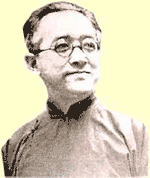国学大师 胡适

胡适(1891一1962),原名胡洪[马辛],字适之,安徽绩溪人。学者。
1910年留学 美国,入康乃尔大学,后转入哥伦比亚大学,从学于杜威,深受其实验主义哲学的影响。
1917年初在《新青年》上发表了《文学改良刍议》。
1917年获哲学博士学位,同年回国, 任北京大学教授。参加编辑《新青年》,并发表论文《历史的文学观念论》、《建设的文学革命论》,出版新诗集《尝试集》,成为新文化运动中很有影响的人物。
1919年发表《多 研究些问题,少谈些主义》,主张改良主义。
1920年离开《新青年》,后创办《努力周 报》。
l923年与徐志摩等组织新月社。
1924年与陈西滢、王世杰等创办《现代评论》周 刊。
1932年与蒋廷[fu2]、丁文江创办《独立评论》。
1938年任国民政府驻美国大使。
1946年任北京大学校长。
1948年离开北平,后转赴美国。
1958年任台湾“中央研究院院长”。
胡适一生在哲学、文学、史学、古典文学考证诸 方面都有成就,并有一定的代表性。 著有《五十年来之文学》、《胡适文存》、《白话文学史》、《章回小说考证》 等。
胡适一生的学术活动主要在史学、文学和哲学几个方面,主要著作有《哲 学史大纲》(上) 、《尝试集》、《白话文学史》(上)和《胡适文存(四集)等。他在学术上影响*大的是提倡“大胆的假设 、小心的求证”的治学方法。晚年潜 心于《水经注》的考证,但未及写出定稿。
1962年在台北病逝。
后人评说
轶事趣闻
相关网站
胡氏纪念馆
国学大师--胡适
胡適紀念館
Google:胡适
英文介绍
Hu Shih (Simplified: 胡适, Traditional: 胡適, Pinyin: Hushi), (December 17, 1891-February 24, 1962) was a Chinese philosopher and essayist. His courtesy name was Shizī (適之).
Born Hu Xīng (洪騂) in Shanghai to Hu Chuan (胡傳, courtesy name Tiehua 鐵花) and Feng Shundi (馮順弟), Hu had an ancestry in Jixi (績溪), Anhui. In January 1904, he was arranged to marry Jiang Dongxiu (江冬秀), an illiterate girl one year older than him with bound feet. The marriage took place in December 1917. He received his fundamental education in Jixi and Shanghai.
Being one of the national scholars, on August 16, 1910, Hu was sent to study at Cornell University in the United States and later Columbia University. He was greatly influenced by his professor, John Dewey, and became a lifelong advocate of pragmatic evolutionary change. He received his Ph.D in philosophy in 1917 and returned to lecture in Peking University. During his tenure there, he began to write for New Youth journal, quickly gaining much attention and influence. Hu soon became one of the leading and influential intellectuals during the May Fourth Movement and later the New Culture Movement. He quit New Youth in the 1920s and published several political newspapers and journals with his friends. His most important contribution was promotion of vernacular literature (Baihua) to replace classic literature (see Classical Chinese).
He was ambassador from the Republic of China to the United States of America (1938-1942), chancellor of Peking University (1946-1948), and later 1958 president of the Academia Sinica in Taiwan, where he remained until his death by heart attack in Nangang at the age of 71. He was chief executive of the Free China Journal, which was eventually shut down for criticizing Chiang Kai-shek.
|